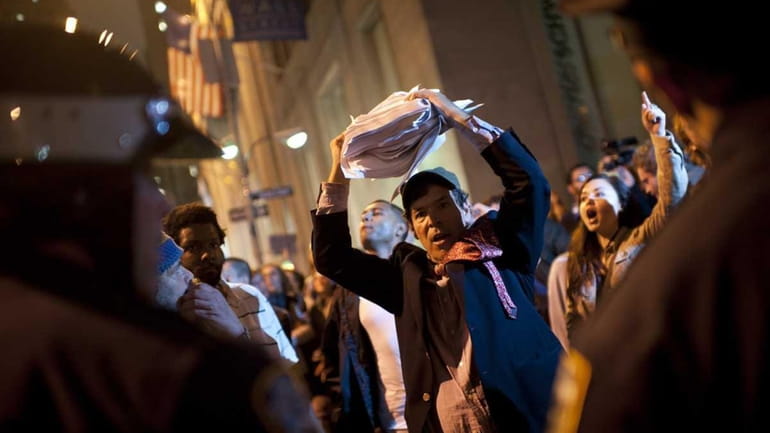One pol's 'movement' is another's 'mob'

Occupy Wall Street protesters try to talk their way past police blocking Cipriani Wall Street. (Oct. 13, 2011) Credit: Charles Eckert
An ironic role reversal takes hold these days in the national red-state-versus-blue-state smackdown.
The instant that Barack Obama entered the White House, many Democrats abruptly ceased to fret about deadly foreign entanglements and the "imperial presidency."
Now, Republican Party reaction to the Occupy Wall Street demonstrations contrasts just as sharply with the GOP's response to the tea party phenomenon.
Party protocol demands the demonstrators to which your leaders must listen -- potential voters for your side -- be treated as concerned citizens deserving respect. Boisterous rallies on the other side, however, must be cast as the work of thugs and dupes.
House Majority Leader Eric Cantor (R-Va.) said last week he was "increasingly concerned about the growing mobs occupying Wall Street and the other cities across the country." Inside Cantor's caucus, Rep. Peter King (R-Seaford) talked on a radio show about "ragtag mobs" and said "The fact is, these people are anarchists. . . . They have no sense of purpose other than a basically anti-American tone."
State GOP chairman Ed Cox's chief of staff, Anthony Casale, said Wednesday he sees the Occupy Wall Street phenomenon as "orchestrated" and "union-driven," unlike the "conservative-minded anti-government, anti-tax people who are very sincere in their beliefs." Suffolk Republican chairman John Jay LaValle -- asked about the difference in protest movements -- said: "This Occupy Wall Street group seems to be an orchestrated effort by the Democratic Party to counter the tea party movement."
Top Democrats sounded just like that when they sought to spin tea party successes as "AstroTurf roots." In 2009, House Speaker Nancy Pelosi (D-Calif.) -- who'd later lose her majority in midterm elections -- said: "It's funded by the high end, by some of the wealthiest people in America, to keep the focus on tax cuts for the rich instead of the great middle class."
Mark Green, the Great Neck-raised Democratic activist, author, and former elected official, wrote last year as self-described tea party loyalists gained House seats: "Like locusts awakening after a half-century slumber, they're back! Not as a laughable Bircher fringe talking about fluoride in our water as a communist plot, but radicals who appear to be taking over a major party."
Recent events also show the latest use of the "discredited-by-bad-behavior" rhetoric. One side complains when youths camped out in lower Manhattan defy police, trash private property, or even hide from warrants in the encampment. The other side sounds alarms when tea partyers bring guns to rallies and carry a sign or two urging Obama to, say, "go back to Kenya."
Exactly how the newer Occupy Wall Street will pressure and push Democratic policy remains to be seen. Does the tea party parallel apply?
"Yes and no," Arthur J. Kremer, former Democratic assemblyman from Nassau, said this week. "Yes, because it relates to a lot of issues that the Democrats have stood for. No, because the Democrats don't know how the public at large is going to accept it."
All this comes quite late in the economic policy debate.
For better or worse, Democrats and Republicans together enacted bank bailouts and tax breaks, expanded federal spending, changed Wall Street rules while collecting huge contributions from its denizens, and signed on to corporate trade deals now frequently blamed for job losses.
None of that is about to change soon.
